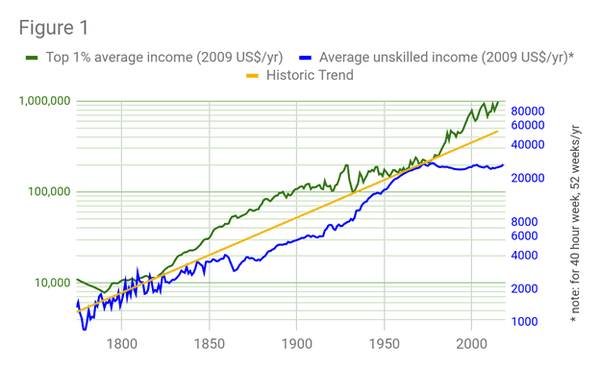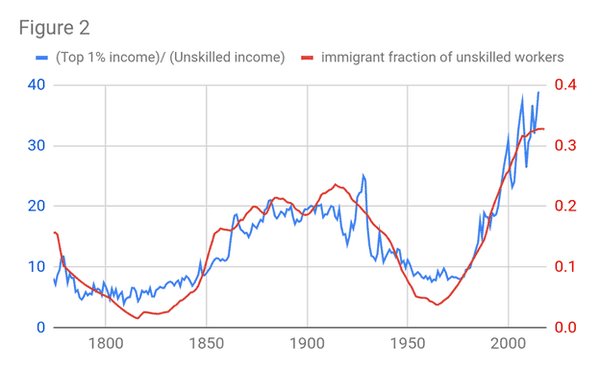Why Rich People Love Poor Immigrants
David Lee, American Thinker, November 20, 2019
Soon after the Immigration Act of 1965 was passed, real wages of low-skilled workers soon stopped growing and have gone nowhere ever since. The incomes of the rich, however, accelerated upward. Both events can be explained by the mass immigration of cheap labor. The combination of these events presents an immediate threat to democracy.
The inflation-adjusted wages of low-skilled workers would now be double current levels, if they had kept up with the historic trend (which is driven by the advance of technology and knowledge). But the incomes of the rich have gone up at about double the historic trend rate, as shown in Figure 1. (Click here for my sources and notes.) Similar things happened from 1820 to 1910.

The ratio of the top 1% of incomes to unskilled income has quadrupled since 1972, to a level far exceeding the previous peak in 1928. The graph in Figure 2 shows that this ratio has gone up and down with the immigrant fraction of unskilled workers in the economy since 1774.

The failure of unskilled wages to keep up with the trend is what we would expect because the labor market was flooded with unskilled immigrants in the decades after 1825, and again after 1965. The laws of supply and demand dictate that when the supply of labor goes up, wages go down, assuming the demand for labor does not rise by a proportional amount.
The incomes of the rich have benefited dramatically because high-income people generally supply the managerial expertise that directs and controls the labor of the people. (I include investors and business owners in the term “managers”.) The supply of skilled managers did not increase very much during these surges of low-wage labor. But the demand for managers went up because the number of workers in need of management went up. Also the amount of management needed per worker went up because of the lower “self-management” skills of the workers. The laws of supply and demand work on the demand side in this case.
Everyone has some management talent, but the people we call “managers” have significantly more management talent than the average person. As the pool of less talented people grows with mass importation of cheap labor, the demand for managers grows, and more workers with marginal management talent are pulled into management positions. The top managers, the “managers of managers,” are thus in greater demand, because more lower-level managers must be managed. Also the management skills of the lower level managers are lower than before, so even more upper-level management is needed.
As a result, the income gap between the rich and the very rich has grown dramatically. The top 1% of incomes were multiplied by 2.6, between 1979 and 2017, while the top 0.1% of incomes were multiplied by 4.4 in inflation-adjusted terms.
As the divide between the very rich and the rest of the people has widened, democracy has been weakened and is now immediately endangered. Political giving, charitable giving, spending, and investment that influences society and culture has become increasingly dominated by the very wealthy. That would not be so bad if the rich were wise. But as their power and influence has grown, they have become more arrogant and willing to believe they can and should radically change society, regardless of the desires of ordinary people. The theories they follow to “fundamentally transform” society come mostly from leftist crackpots.
Arrogant leftist billionaires use their great wealth to influence and buy news media, fund pressure groups, and buy politicians in order to increase the immigration of cheap labor and thus increase their wealth. But they also use these powers to bring their crazy beliefs into fruition. They even use their power to punish those who do not go along and parrot their beliefs. They fund and train “community activists” and other rabble rousers to make the poor believe that their oppression is caused by the opponents of these lunatic ideas, rather than by the mass immigration that these billionaires push.
The previous great wave of immigration lasted over a hundred years (1820-1924) before the people were finally able to stop it. The final victory in 1924 came only after a long frustrating struggle against the “malefactors of great wealth,” as Teddy Roosevelt called them. Over the next 40 years following 1924, the countless leagues, committees, roundtables, movements, champions, orators, books, and pamphlets of the struggle grew old and faded away as our nation assimilated its immigrants. Wages surged upward as the incomes of the rich stagnated. The people regained control of their government and culture by the 1950s. But in the 1960s, a new generation forgot how and why their grandparents had fought against that great flood of cheap labor.
As soon as the people forgot, the business interests greedy for cheap labor paid politicians to start up the next great wave. Unless we want to lose our constitutional republic and be ruled by the careless whims of billionaire overlords, we must learn from the records left by our forefathers, and correct the widening power gap as quickly as possible. The attacks on our freedoms, especially freedom of speech, have become so fierce and effective that we should be spurred to more drastic actions than in the past.
Cutting off the flow of cheap labor into the country will correct this problem only very slowly, over a period of 40 years or so, as the immigrants retire and their children assimilate. Before the end of that period, our republic might die. I believe Teddy Roosevelt showed us the way with his “trust busting” and other quick and direct actions. The actions we might choose to take may be different than his were, but the time for fastidious adherence to precedent has run out.
In his “malefactors of great wealth” speech, Teddy explains to us what is at stake: “I regard this contest as one to determine who shall rule this free country — the people through their governmental agents or a few ruthless and domineering men, whose wealth makes them peculiarly formidable, because they hide behind the breastworks of corporate organization.”
Ultimately, Teddy’s goal was not merely to stop “unfair competition” or “restraint of trade.” His main goal was to save democracy from a concentration of power that had fallen into the hands of a few plutocrats. The flood of cheap labor was finally stopped in 1924, but only after Teddy had smashed or regulated the trusts and turned the population against the malefactors of great wealth. Otherwise, the victory in 1924 might never have been attained, and our democracy might have become a mega-corporate kleptocracy with a billion impoverished and servile workers.

















